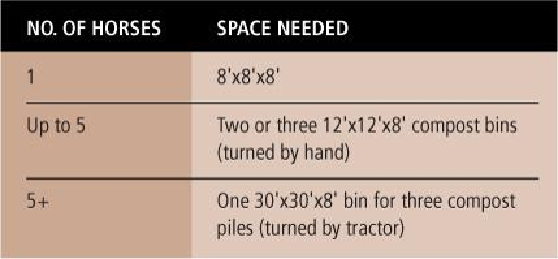Agriculture Reference
In-Depth Information
The process of decomposition of a manure pile can take anywhere from 2 months in
summer to 5 months in winter, and the quality of the resulting humus will vary. Composting
horse manure could become a lucrative cash by-product of your horse operation, because
landscapers, mushroom growers, and worm farmers seek good-quality humus. You could
also use it to enhance the soil on your property; humus improves plant growth, makes the
soil softer and more aerated, and increases the soil's ability to hold water.
It is best to spread manure or compost four times during the pasture-growing sea-
son—spring to early fall—at the rate of ¼ inch per application, or approximately 1 inch
total per year.
Space for manure/compost
Flies and Other Pests
Stable flies, horseflies, deerflies, horn flies, face flies, mosquitoes, and ticks are all blood-
suckers and create problems for horses and their owners. Mosquitoes, ticks, and other in-
sects are carriers of diseases such as West Nile virus, Lyme disease, and pigeon fever (dry-
land distemper) and can become a management nightmare for horse owners.
STABLE FLIES
Stable flies are the same size as common houseflies. Both males and females draw blood,
commonly feeding on the lower legs, flanks, belly, under the jaw, and at the junction of the
neck and the chest. When they have finished feeding, they seek shelter to rest and digest.
Their bite is painful; some horses have such a low fly-tolerance threshold that they can be

